The Thanhouser Company Photoplay of Lucile
released August 27 and August 30, 1912.
Synopsis from
The Moving Picture World, August 24, 1912,
and selected contemporary reviews
"PART ONE: Lucile, the Comtesse de Nevers, was engaged to a nobleman, Lord Alfred Vargrave. Being deeply in love, Lucile did not conceal her affection, and her attentions finally wearied Lord Alfred, and he neglected his fiancée. They quarreled finally, and separated, but not until Alfred had vainly attempted a reconciliation. Lucile told him that she was afraid to trust him but proposed a year's separation. Before the year was over the Comtesse received word of the engagement of Lord Alfred to Miss Darcy, whereupon she wrote him asking the return of her letters, which in accordance with his pledge, he was to bring to her personally. Alfred obeyed and started for Lucile's home with the missives. Upon his arrival he was amazed to see how beautiful Lucile was, and how much other men admired her. His old affection returned and he pleaded with her to forgive him. Lucile refused to listen to him. He managed, by watching her, to meet her presumably by accident, and gained her consent to accompany her. On the road they encountered a furious summer storm and took refuge in a cave. Lucile, whose one dread was of lightning, was hysterical from terror, and did not repulse Alfred when he clasped her in his arms. She consented to forgive her recreant lover.
"PART TWO: The Duc de Luvois had long vainly courted Lucile. His jealous eyes soon noted that the man who stood in his way was Lord Alfred, and as the latter left the house, the Duc drew a revolver, determined to kill him. The brave Lucile noted the action, threw her arms about him, and pinned him fast. Alfred looked around at this moment, just in time to see, as he imagined, his Lucile embracing another man. Deciding that she was false, he waited not for explanations, but hurried to the home of Miss Darcy, and they were promptly wedded. The Duc returned sadly to his castle, while Lucile, weary of the world, sought refuge in a nunnery. Twenty-five years later, Lord Alfred, happy in the affection of his devoted wife and child, now grown to manhood, had forgotten the sadness of his youth. The Duc had remained unmarried, but into his lonely life one ray of sunshine had penetrated. This was the daughter of his dead sister, a girl of sixteen. With her he visited England, as he felt his life of seclusion would not be a happy one for the young girl. In England, Lord Alfred's son and the Duc's niece met, and promptly lost their hearts. When Lord Alfred learned of his son's affections, he placed no obstacle in the path of his only child's happiness. He felt no animosity toward the Duc, simply feeling that, although they had been rival suitors at one time for the hand of Lucile, the past should now be buried and forgotten. But the Duc, feeling that it was he who lost him Lucile's love, never forgave. When he learned his niece wished to marry the son of his ancient enemy he refused absolutely to sanction the union. The Duc, a French general, and Alfred's son, a lieutenant in the English army, were shortly called to the front.
"PART THREE: Lord Alfred's son was wounded, and being carried to the hospital tent, was nursed tenderly by Lucile. The young soldier had no desire to live, knowing that he could never wed the girl of his choice. Lucile gradually learned from him the cause of his secret sorrow, and going to the Duc entreated him for the memory of the love he once bore her, not to make desolate the life of his young niece as her love had been made desolate. The Duc was finally won over, and the young lovers reunited, while Lucile returned to her convent."
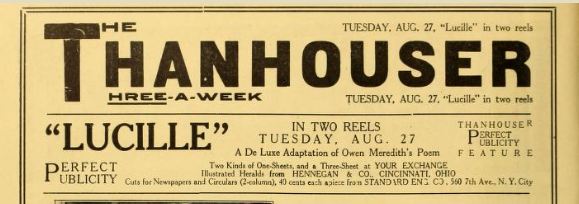
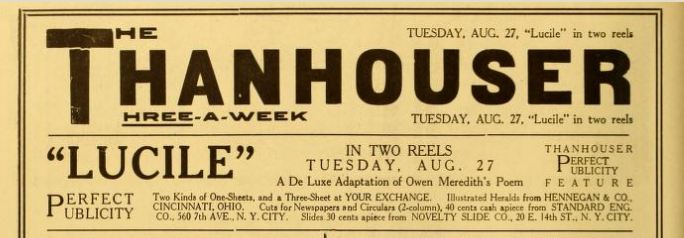
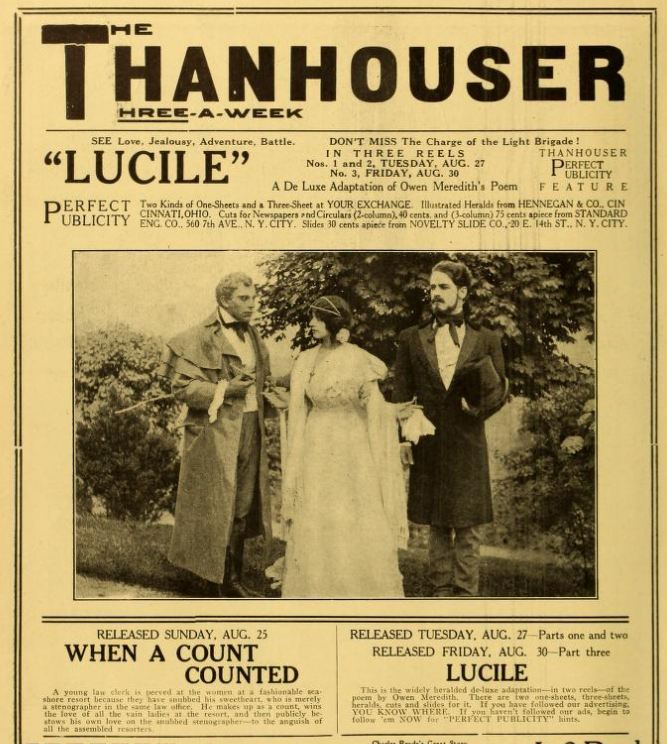
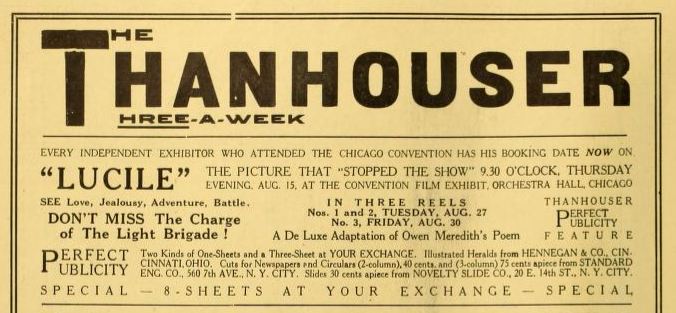
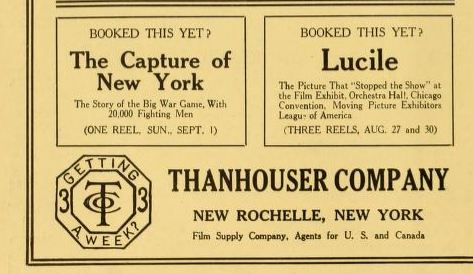
The Bioscope, November 14, 1912:
"Out of Owen Meredith's poem, the Thanhouser Company have evolved a drama of more than ordinary interest, including many highly dramatic situations, amongst which is a representation of the charge of the Light Brigade at Balaclava. The play opens with a lover's quarrel between Lord Alfred and Lucile, and the early scenes show how, having, in a fit of pique, entered into a flirtation with the heiress, Miss Darcy, Lord Alfred is requested by Lucile to return the letter he has previously received from her. During the interview at which this is effected, Lord Alfred's feelings for Lucile are revived, and as her affections for him have suffered no change, their engagement is renewed. This awakens the jealousy of another suitor, the Duc de Luvois, who is tempted to shoot Lord Alfred. He is only prevented by the entreaties of Lucile, and these being misconstrued by her lover, he returns to Miss Darcy, whom he eventually marries, while Lucile seeks consolation in a convent. Years later Lord Alfred's only son, Richard, falls in love with Constance, the niece of the Duc de Luvois. The Duc, who still entertains feelings of animosity towards Lord Alfred, refuses his consent to their marriage, and Richard goes off to the Crimea, where, taking part in the charge of the Light Brigade, he is seriously wounded, and nursed back to health by Lucile, now a sister of mercy, who is instrumental in reconciling her two former suitors, and so bringing about Richard's ultimate happiness.
"As adapted to the film, a strong and interesting drama is the result, and is made the most of by a very efficient company, the part of Lucile being particularly well treated. The surroundings are picturesque in the extreme, and many of the scenes are of great beauty. The costumes of the early part of the play are tasteful and becoming, but that the costumes of 1820 are picturesque is hardly a justification for continuing to wear them in 1854. This is hardly balanced by the fact that the uniforms worn in the Crimea are rather obviously of a later period. But whatever their uniforms, the behaviour of the regiment is quite up to tradition, and the exciting incidents of the famous charge are admirably reproduced. This is only one of many dramatic scenes of which the play is full, and the final picture of Lucile alone in her convent cell brings an interesting story to a very beautiful conclusion."
Gordon Trent, The Morning Telegraph, August 18, 1912:
"Thanhouser's three-reel production of Owen Meredith's poem, Lucile, is a wonder. I had the pleasure of viewing it at the Film Supply Company's projection room, and it is a sure winner as a feature offering. The firm is rushing offerings out at a fast clip, and their three-a-week programme is retaining the high standard established from the commencement of the releases."
The Morning Telegraph, September 1, 1912:
"Owen Meredith's world-known poem of Lucille [sic] is treated in a wholly delightful way in this photoplay production. The story is so well known that its repetition is needless. The theme of the poem is followed as closely as possible and there is little left to the imagination, for the plot is easily followed from beginning to end. In costumes, scenes, both interior and out of doors, it is exceedingly well made. It is splendidly acted and the photography is as clear and sharp as could be desired. Little bits of stage business are carefully done, as in the writing of a letter, which is folded and sealed as was done in the days before the invention of the envelope. An exterior, beautiful and appropriate, shows a door which is closed after the people exit or enter, though the interior scene, supposedly from the inside of this doorway, shows a French windowed entrance open all of the time. Few, however, might note such a slight discrepancy. In the cast of the three reel offering are Marguerite Snow as Lucille, James Cruze as Lord Alfred, Flo LaBadie as Matilda, William Russell as the Duke, William Garwood as Richard and Mignon Anderson as the niece. For a feature production it reflects the highest credit on the makers, the director and the players. It will be enjoyed wherever shown."
Margaret I. MacDonald, The Moving Picture News, August 17, 1912:
"Of the recent pretentious productions attempted by the Thanhouser company, the one of Owen Meredith's story of Lucile, is, in the writer's mind, the best and most flawless in general contour. The story of Lucile lends itself beautifully to the motion picture production. It has all that appeals to the human heart - tense dramatic situations, sweetness and simplicity, and an old-fashioned atmosphere about it that suggests quaint old engravings that have been stowed away in the attic for generations. Although the story of Lucile is thoroughly familiar to the bookworm, there may be some among our readers who cannot answer to that name, and for their benefit it might be well to give a brief outline of the story. It is also interesting to know that Owen Meredith, the writer of Lucile, was a son of the famous Bulwer-Lytton, and that, being unwilling to learn his laurels through the reflection of the literary genius of his ancestor, was known only as Owen Meredith until such time as he won fame through the success of Lucile... Much credit is reflected in this production on the work of all the participants, but perhaps more particularly upon Miss Snow, whose work is exceptionally fine. Miss Anderson is refreshingly sweet, and Miss LaBadie is always charming."
Last revised: 8 December 2010